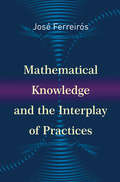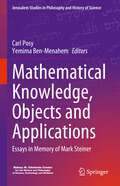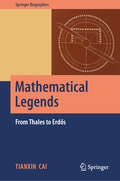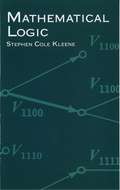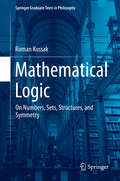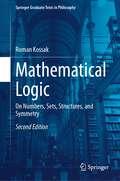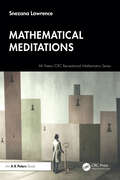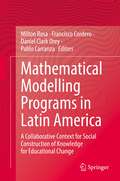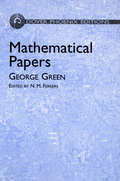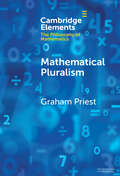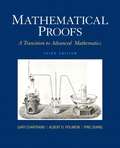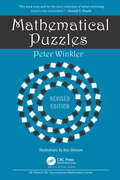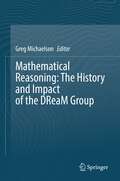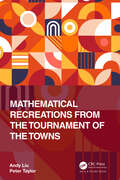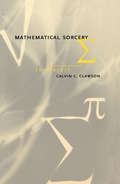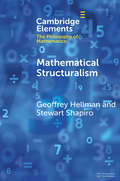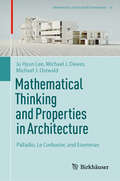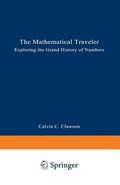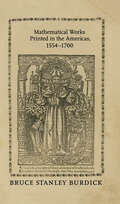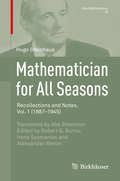- Table View
- List View
Mathematical Knowledge and the Interplay of Practices
by José FerreirósThis book presents a new approach to the epistemology of mathematics by viewing mathematics as a human activity whose knowledge is intimately linked with practice. Charting an exciting new direction in the philosophy of mathematics, José Ferreirós uses the crucial idea of a continuum to provide an account of the development of mathematical knowledge that reflects the actual experience of doing math and makes sense of the perceived objectivity of mathematical results.Describing a historically oriented, agent-based philosophy of mathematics, Ferreirós shows how the mathematical tradition evolved from Euclidean geometry to the real numbers and set-theoretic structures. He argues for the need to take into account a whole web of mathematical and other practices that are learned and linked by agents, and whose interplay acts as a constraint. Ferreirós demonstrates how advanced mathematics, far from being a priori, is based on hypotheses, in contrast to elementary math, which has strong cognitive and practical roots and therefore enjoys certainty.Offering a wealth of philosophical and historical insights, Mathematical Knowledge and the Interplay of Practices challenges us to rethink some of our most basic assumptions about mathematics, its objectivity, and its relationship to culture and science.
Mathematical Knowledge, Objects and Applications: Essays in Memory of Mark Steiner (Jerusalem Studies in Philosophy and History of Science)
by Yemima Ben-Menahem Carl J. PosyThis book provides a survey of a number of the major issues in the philosophy of mathematics, such as ontological questions regarding the nature of mathematical objects, epistemic questions about the acquisition of mathematical knowledge, and the intriguing riddle of the applicability of mathematics to the physical world. Some of these issues go back to the nascent years of mathematics itself, others are just beginning to draw the attention of scholars. In addressing these questions, some of the papers in this volume wrestle with them directly, while others use the writings of philosophers such as Hume and Wittgenstein to approach their problems by way of interpretation and critique. The contributors include prominent philosophers of science and mathematics as well as promising younger scholars. The volume seeks to share the concerns of philosophers of mathematics with a wider audience and will be of interest to historians, mathematicians and philosophers alike.
Mathematical Legends: From Thales to Erdős (Springer Biographies)
by Tianxin CaiThis book is not only about the history of mathematics, but also by telling the story of some of the most distinctive personalities in the history of mathematics, it goes on to reveal the various strange treasures, bright flowers and hidden passions of the mathematical kingdom. Some of these mathematicians were thinkers, writers, poets, musicians, painters, politicians, judges, soldiers, clerks, young men of society or even prisoners. The mathematical world constructed by these geniuses is exquisite, and a walk in such a world not only expands our mathematical horizons and imagination, but also raises our humanistic cultivation to a higher level. Written for general audience, this book will be of interest to anyone who's studied mathematics in university or even high school, while also benefiting researchers in mathematics and the humanities. The readers will also enjoy reading the beautiful and simple language of all the articles and interviews.
Mathematical Logic
by Stephen Cole KleeneUndergraduate students with no prior classroom instruction in mathematical logic will benefit from this evenhanded multipart text. It begins with an elementary but thorough overview of mathematical logic of first order. The treatment extends beyond a single method of formulating logic to offer instruction in a variety of techniques: model theory (truth tables), Hilbert-type proof theory, and proof theory handled through derived rules.The second part supplements the previously discussed material and introduces some of the newer ideas and the more profound results of twentieth-century logical research. Subsequent chapters explore the study of formal number theory, with surveys of the famous incompleteness and undecidability results of Godel, Church, Turing, and others. The emphasis in the final chapter reverts to logic, with examinations of Godel's completeness theorem, Gentzen's theorem, Skolem's paradox and nonstandard models of arithmetic, and other theorems. The author, Stephen Cole Kleene, was Cyrus C. MacDuffee Professor of Mathematics at the University of Wisconsin, Madison. Preface. Bibliography. Theorem and Lemma Numbers: Pages. List of Postulates. Symbols and Notations. Index.
Mathematical Logic for Computer Science
by Mordechai Ben-AriMathematical Logic for Computer Science is a mathematics textbook with theorems and proofs, but the choice of topics has been guided by the needs of students of computer science. The method of semantic tableaux provides an elegant way to teach logic that is both theoretically sound and easy to understand. The uniform use of tableaux-based techniques facilitates learning advanced logical systems based on what the student has learned from elementary systems. The logical systems presented are: propositional logic, first-order logic, resolution and its application to logic programming, Hoare logic for the verification of sequential programs, and linear temporal logic for the verification of concurrent programs. The third edition has been entirely rewritten and includes new chapters on central topics of modern computer science: SAT solvers and model checking.
Mathematical Logic: Essays On Set Theory, Model Theory, Philosophical Logic And Philosophy Of Mathematics (Ontos Mathematical Logic Ser. #5)
by Roman KossakThis book, presented in two parts, offers a slow introduction to mathematical logic, and several basic concepts of model theory, such as first-order definability, types, symmetries, and elementary extensions. Its first part, Logic Sets, and Numbers, shows how mathematical logic is used to develop the number structures of classical mathematics. The exposition does not assume any prerequisites; it is rigorous, but as informal as possible. All necessary concepts are introduced exactly as they would be in a course in mathematical logic; but are accompanied by more extensive introductory remarks and examples to motivate formal developments. The second part, Relations, Structures, Geometry, introduces several basic concepts of model theory, such as first-order definability, types, symmetries, and elementary extensions, and shows how they are used to study and classify mathematical structures. Although more advanced, this second part is accessible to the reader who is either already familiar with basic mathematical logic, or has carefully read the first part of the book. Classical developments in model theory, including the Compactness Theorem and its uses, are discussed. Other topics include tameness, minimality, and order minimality of structures. The book can be used as an introduction to model theory, but unlike standard texts, it does not require familiarity with abstract algebra. This book will also be of interest to mathematicians who know the technical aspects of the subject, but are not familiar with its history and philosophical background.
Mathematical Logic: On Numbers, Sets, Structures, and Symmetry (Springer Graduate Texts in Philosophy #4)
by Roman KossakThis textbook is a second edition of the successful, Mathematical Logic: On Numbers, Sets, Structures, and Symmetry. It retains the original two parts found in the first edition, while presenting new material in the form of an added third part to the textbook. The textbook offers a slow introduction to mathematical logic, and several basic concepts of model theory, such as first-order definability, types, symmetries, and elementary extensions. Part I, Logic Sets, and Numbers, shows how mathematical logic is used to develop the number structures of classical mathematics. All necessary concepts are introduced exactly as they would be in a course in mathematical logic; but are accompanied by more extensive introductory remarks and examples to motivate formal developments. The second part, Relations, Structures, Geometry, introduces several basic concepts of model theory, such as first-order definability, types, symmetries, and elementary extensions, and shows how they are usedto study and classify mathematical structures. The added Part III to the book is closer to what one finds in standard introductory mathematical textbooks. Definitions, theorems, and proofs that are introduced are still preceded by remarks that motivate the material, but the exposition is more formal, and includes more advanced topics. The focus is on the notion of countable categoricity, which analyzed in detail using examples from the first two parts of the book. This textbook is suitable for graduate students in mathematical logic and set theory and will also be of interest to mathematicians who know the technical aspects of the subject, but are not familiar with its history and philosophical background.
Mathematical Meditations (AK Peters/CRC Recreational Mathematics Series)
by Snezana LawrenceMathematical Meditations identifies, explores, and celebrates those aspects of mathematics that are good for you and your overall wellbeing. It is necessary for everyone to have a little time to think every so often: to contemplate, meditate, and try to understand where you are and what is going on around you. Mathematics can help you with all of that.The Meditations in this book are the product of thousands of years of mathematical discourse. As you read through the book and work through the various exercises, you will discover new mechanisms that allow you to contemplate and understand some complex mathematical principles. However, the focus will always be wider than a mere dry comprehension of theory, as you will be encouraged to meditate upon the deeper intrinsic beauty of mathematics and what it can reveal to us about the world around us.Features An original, engaging narrative format replete with novel exercises and examples Could be used in a classroom setting for liberal arts students, mathematics undergraduates, or high school teachers Accessible to anyone who wants to explore a different kind of perspective on mathematics
Mathematical Modelling Programs in Latin America: A Collaborative Context for Social Construction of Knowledge for Educational Change
by Milton Rosa Daniel Clark Orey Francisco Cordero Pablo CarranzaThis book is about the unique, sophisticated, and rigorous study of mathematics in Latin America developed over centuries of cultural exchange between Europe, North, and South America. More specifically, the book explores the tradition of mathematical modelling, introduced a century ago. This modelling was adapted to assist members of distinct communities to draw information about their own realities through the elaboration of representations, which generate mathematical knowledge that deals with creativity and invention. The book provides empirical evidence that a category of mathematical modelling developed in Latin America assesses the horizontal and reciprocal relations between mathematics (school/non-school contexts) and the real world. These relations provide an epistemological and ontological change, where mathematical knowledge of the others is recognized on a horizontal plane. Further, they oblige mathematics teachers and students to understand as a community of knowledge that builds their own mathematical categories of their environment governed by the reciprocal relationships between academic knowledge and functional knowledge. The dimensions of the relationships make up a frame of reference that guides educational change in mathematics. The book presents an inquiry-based approach of three Latin American modelling programs: ethnomodelling, transversality of knowledge, and reasoned decision-making. Each one, with its respective theoretical and methodological foundations related to ethnomathematics and mathematical modelling, socioepistemology, and the attribution of meaning to learning. Undoubtedly, the three mathematical modelling programs, independently, provide educational gains, each with its levels of specificity and loyal to its philosophical, theoretical, and methodological principles. However, the book places them together, organized by axes, to define a corpus of mathematical knowledge that envisions profound educational change through the development of different approaches of mathematical modelling. The authors of the 18 chapters in this book, who represent the diversity of Latin America, are from eight countries: Argentina, Brazil, Chile, Colombia, Costa Rica, Cuba, Ecuador, Honduras, and Mexico. They were invited to share their ideas, perspectives, and discuss investigations that represent a rich sample of three Latin American perspectives on mathematical modelling.
Mathematical Notations (Elements in the Philosophy of Mathematics)
by Dirk SchlimmThis Element lays the foundation, introduces a framework, and sketches the program for a systematic study of mathematical notations. It is written for everyone who is curious about the world of symbols that surrounds us, in particular researchers and students in philosophy, history, cognitive science, and mathematics education. The main characteristics of mathematical notations are introduced and discussed in relation to the intended subject matter, the language in which the notations are verbalized, the cognitive resources needed for learning and understanding them, the tasks that they are used for, their material basis, and the historical context in which they are situated. Specific criteria for the design and assessment of notations are discussed, as well as ontological, epistemological, and methodological questions that arise from the study of mathematical notations and of their use in mathematical practice.
Mathematical Olympiad Treasures
by Titu Andreescu Bogdan EnescuMathematical Olympiad Treasures aims at building a bridge between ordinary high school exercises and more sophisticated, intricate and abstract concepts in undergraduate mathematics. The book contains a stimulating collection of problems in the subjects of algebra, geometry, trigonometry, number theory and combinatorics. While it may be considered a sequel to "Mathematical Olympiad Challenges," the focus is on engaging a wider audience to apply techniques and strategies to real-world problems. Throughout the book students are encouraged to express their ideas, conjectures, and conclusions in writing. The goal is to help readers develop a host of new mathematical tools that will be useful beyond the classroom and in a number of disciplines.
Mathematical Papers (Dover Books on Mathematics)
by George Green N. M. FerrersAn almost entirely self-taught mathematical genius, George Green (1793 -1841) is best known for Green's theorem, which is used in almost all computer codes that solve partial differential equations. He also published influential essays, or papers, in the fields of hydrodynamics, electricity, and magnetism. This collection comprises his most significant works.The first paper, "An Essay on the Application of Mathematical Analysis to the Theories of Electricity and Magnetism," which is also the longest and perhaps the most Important, appeared In 1828. It introduced the term potential as designating the result obtained by adding together the masses of all the particles of a system, each divided by its distance from a given point. Its three-part treatment first considers the properties of this function and then applies them, in the second and third parts, to the theories of magnetism and electricity.The following paper, "Mathematical Investigations concerning the Laws of the Equilibrium of Fluids analogous to the Electric Fluid," exhibits great analytical power, as does the next, "On the Determination of the Exterior and Interior Attractions of Ellipsoids of Variable Densities." Other highlights include the brief but absorbing paper, "On the Motion of Waves in a variable canal of small depth and width," and two of his most valuable memoirs, "On the Laws of Reflexlon and Refraction of Sound" and "On the Reflexlon and Refraction of Light at the common surface of two non-crystallized Media," which should be studied together.
Mathematical Pluralism (Elements in the Philosophy of Mathematics)
by Graham PriestMathematical pluralism is the view that there is an irreducible plurality of pure mathematical structures, each with their own internal logics; and that qua pure mathematical structures they are all equally legitimate. Mathematical pluralism is a relatively new position on the philosophical landscape. This Element provides an introduction to the position.
Mathematical Proofs: A Transition To Advanced Mathematics (Third Edition)
by Ping Zhang Gary Chartrand Albert D. PolimeniMathematical Proofs: A Transition to Advanced Mathematics, Third Edition, prepares students for the more abstract mathematics courses that follow calculus. Appropriate for self-study or for use in the classroom, this text introduces students to proof techniques, analyzing proofs, and writing proofs of their own. Written in a clear, conversational style, this book provides a solid introduction to such topics as relations, functions, and cardinalities of sets, as well as the theoretical aspects of fields such as number theory, abstract algebra, and group theory. It is also a great reference text that students can look back to when writing or reading proofs in their more advanced courses.
Mathematical Puzzles: Revised Edition (AK Peters/CRC Recreational Mathematics Series)
by Peter WinklerResearch in mathematics is much more than solving puzzles, but most people will agree that solving puzzles is not just fun: it helps focus the mind and increases one's armory of techniques for doing mathematics. Mathematical Puzzles makes this connection explicit by isolating important mathematical methods, then using them to solve puzzles and prove a theorem.This Revised Edition has been thoroughly edited to correct errors and provide clarifications, and includes some totally different solutions, modified puzzles, and one entirely new puzzle.Features A collection of the world’s best mathematical puzzles Each chapter features a technique for solving mathematical puzzles, examples, and finally a genuine theorem of mathematics that features that technique in its proof Puzzles that are entertaining, mystifying, paradoxical, and satisfying; they are not just exercises or contest problems.
Mathematical Reasoning: The History and Impact of the DReaM Group
by Greg MichaelsonThis collection of essays examines the key achievements and likely developments in the area of automated reasoning. In keeping with the group ethos, Automated Reasoning is interpreted liberally, spanning underpinning theory, tools for reasoning, argumentation, explanation, computational creativity, and pedagogy. Wider applications including secure and trustworthy software, and health care and emergency management. The book starts with a technically oriented history of the Edinburgh Automated Reasoning Group, written by Alan Bundy, which is followed by chapters from leading researchers associated with the group. Mathematical Reasoning: The History and Impact of the DReaM Group will attract considerable interest from researchers and practitioners of Automated Reasoning, including postgraduates. It should also be of interest to those researching the history of AI.
Mathematical Recreations from the Tournament of the Towns (AK Peters/CRC Recreational Mathematics Series)
by Peter Taylor Andy LiuMathematical Recreations from the Tournament of the Towns contains the complete list of problems and solutions to the International Mathematics Tournament of the Towns from Fall 2007 to Spring 2021.The primary audience for this book is the army of recreational mathematicians united under the banner of Martin Gardner. It should also have great value to students preparing for mathematics competitions and trainers of such students. This book also provides an entry point for students in upper elementary schools. Features Huge recreational value to mathematics enthusiasts Accessible to upper-level high school students Problems classified by topics such as two-player games, weighing problems, mathematical tasks etc.
Mathematical Rigour and Informal Proof (Elements in the Philosophy of Mathematics)
by Fenner Stanley TanswellThis Element looks at the contemporary debate on the nature of mathematical rigour and informal proofs as found in mathematical practice. The central argument is for rigour pluralism: that multiple different models of informal proof are good at accounting for different features and functions of the concept of rigour. To illustrate this pluralism, the Element surveys some of the main options in the literature: the 'standard view' that rigour is just formal, logical rigour; the models of proofs as arguments and dialogues; the recipe model of proofs as guiding actions and activities; and the idea of mathematical rigour as an intellectual virtue. The strengths and weaknesses of each are assessed, thereby providing an accessible and empirically-informed introduction to the key issues and ideas found in the current discussion.
Mathematical Sorcery: Revealing the Secrets of Numbers
by Calvin C. ClawsonThe secret of constellations, the enigma of the golden mean, and the brilliance of a proof-these are just some of the wonders Clawson explores with unbridled delight in this recreational math book. Throughout the book he divulges the wisdom of the ancient Greeks, Sumerians, Babylonians, and Egyptians, whose stunning revelations still have deep meaning today. Transporting us beyond mere appreciation, Clawson urges us to tackle functions, tangents, and the concept of infinity. He helps us intuitively comprehend these and other building blocks of mathematics through explaining their discovery and uses. By accompanying him on his journey, we taste the fruit of knowledge that has eluded us until now.
Mathematical Structuralism (Elements in the Philosophy of Mathematics)
by Geoffrey Hellman Stewart ShapiroThe present work is a systematic study of five frameworks or perspectives articulating mathematical structuralism, whose core idea is that mathematics is concerned primarily with interrelations in abstraction from the nature of objects. The first two, set-theoretic and category-theoretic, arose within mathematics itself. After exposing a number of problems, the book considers three further perspectives formulated by logicians and philosophers of mathematics: sui generis, treating structures as abstract universals, modal, eliminating structures as objects in favor of freely entertained logical possibilities, and finally, modal-set-theoretic, a sort of synthesis of the set-theoretic and modal perspectives.
Mathematical Tablets from Tell Harmal
by Carlos GonçalvesThis work offers a re-edition of twelve mathematical tablets from the site of Tell Harmal, in the borders of present-day Baghdad. In ancient times, Tell Harmal was Saduppûm, a city representative of the region of the Diyala river and of the kingdom of Esnunna, to which it belonged for a time. These twelve tablets were originally published in separate articles in the beginning of the 1950s and mostly contain solved problem texts. Some of the problems deal with abstract matters such as triangles and rectangles with no reference to daily life, while others are stated in explicitly empirical contexts, such as the transportation of a load of bricks, the size of a vessel, the number of men needed to build a wall and the acquisition of oil and lard. This new edition of the texts is the first to group them, and takes into account all the recent developments of the research in the history of Mesopotamian mathematics. Its introductory chapters are directed to readers interested in an overview of the mathematical contents of these tablets and the language issues involved in their interpretation, while a chapter of synthesis discusses the ways history of mathematics has typically dealt with the mathematical evidence and inquires how and to what degree mathematical tablets can be made part of a picture of the larger social context. Furthermore, the volume contributes to a geography of the Old Babylonian mathematical practices, by evidencing that scribes at Saduppûm made use of cultural material that was locally available. The edited texts are accompanied by translations, philological, and mathematical commentaries.
Mathematical Thinking and Properties in Architecture: Palladio, Le Corbusier, and Eisenman (Mathematics and the Built Environment #10)
by Michael J. Ostwald Michael J. Dawes Ju Hyun LeeThis monograph explores the profound connections between architecture and mathematics through the works of Andrea Palladio, Le Corbusier, and Peter Eisenman. Combining historical insights with computational analyses, it examines the social, spatial, and aesthetic properties of twenty-six iconic designs. Advanced methods such as Space Syntax, isovists, fractal analysis, image segmentation and semantic linguistic analysis reveal the mathematical principles underlying architectural thinking and properties. Richly illustrated with over 100 visuals, this volume is an essential resource for senior undergraduates, postgraduates, practicing architects, and historians seeking a deeper understanding of mathematical thinking in architectural design and analysis.
Mathematical Traveler: Exploring The Grand History Of Numbers
by Calvin C. ClawsonThe story of numbers is a rich, sweeping history that shows how our mathematical achievements contributed to the greatest innovations of civilization. Calvin Clawson, acclaimed author of Conquering Math Phobia, weaves a story of numbers that spans thousands of years. As Clawson so clearly shows, numbers are not only an intrinsic and essential thread in our modern lives, but have always been an integral part of the human psyche - knit into the very fabric of our identity as humans. Clawson travels back through time to the roots of the history of numbers. In exploring early human fascination with numbers, he unearths the clay beads, knotted ropes, and tablets used by our ancestors as counting tools. He then investigates how numeric symbols and concepts developed uniquely and independently in Meso-America, China, and Egypt. As he persuasively argues, the mathematical concepts that arose and flourished in the ancient world enabled the creation of architectural masterpieces as well as the establishment of vast trade networks. Continuing the journey, Clawson brings us to the elegant logic of numbers that soon came to distinguish itself as a discipline and the language of science. From the concepts of infinity contemplated by the Greeks to the complex numbers that are indispensable to scientists on the cutting edge of research today, Clawson breathes life and meaning into the history of great mathematical mysteries and problems. In this spirit of inquiry, he explores, in their times and places, the discovery of numbers that lie outside the province of counting, including irrational numbers, transcendentals, complex numbers, and the enormous transfinite numbers. The personalities and the creative feats surrounding each mathematical invention come alive vividly in Clawson's lucid prose. In this work of breathtaking scope, Clawson guides us through the wonders of numbers and illustrates their monumental impact on civilization.
Mathematical Works Printed in the Americas, 1554–1700 (Johns Hopkins Studies in the History of Mathematics)
by Bruce Stanley BurdickThis magisterial annotated bibliography of the earliest mathematical works to be printed in the New World challenges long-held assumptions about the earliest examples of American mathematical endeavor. Bruce Stanley Burdick brings together mathematical writings from Mexico, Lima, and the English colonies of Massachusetts, Pennsylvania, and New York. The book provides important information such as author, printer, place of publication, and location of original copies of each of the works discussed. Burdick’s exhaustive research has unearthed numerous examples of books not previously cataloged as mathematical. While it was thought that no mathematical writings in English were printed in the Americas before 1703, Burdick gives scholars one of their first chances to discover Jacob Taylor’s 1697 Tenebrae, a treatise on solving triangles and other figures using basic trigonometry. He also goes beyond the English language to discuss works in Spanish and Latin, such as Alonso de la Vera Cruz's 1554 logic text, the Recognitio Summularum; a book on astrology by Enrico Martínez; books on the nature of comets by Carlos de Sigüenza y Góngora and Eusebio Francisco Kino; and a 1676 almanac by Feliciana Ruiz, the first woman to produce a mathematical work in the Americas. Those fascinated by mathematics, its history, and its culture will note with interest that many of these works, including all of the earliest ones, are from Mexico, not from what is now the United States. As such, the book will challenge us to rethink the history of mathematics on the American continents.
Mathematician for All Seasons
by Hugo SteinhausRobert G. Burns Irena Szymaniec Aleksander WeronThis book presents, in his own words, the life of Hugo Steinhaus (1887-1972), noted Polish mathematician of Jewish background, educator, and mathematical popularizer. A student of Hilbert, a pioneer of the foundations of probability and game theory, and a contributor to the development of functional analysis, he was one of those instrumental to the extraordinary flowering of Polish mathematics before and after World War I. In particular, it was he who "discovered" the great Stefan Banach. Exhibiting his great integrity and wit, Steinhaus's personal story of the turbulent times he survived - including two world wars and life postwar under the Soviet heel - cannot but be of consuming interest. His recounting of the fearful years spent evading Nazi terror is especially moving. The steadfast honesty and natural dignity he maintained while pursuing a life of demanding scientific and intellectual enquiry in the face of encroaching calamity and chaos show him to be truly a mathematician for all seasons. The present work will be of great interest not only to mathematicians wanting to learn some of the details of the mathematical blossoming that occurred in Poland in the first half of the 20th century, but also to anyone wishing to read a first-hand account of the history of those unquiet times in Europe - and indeed world-wide - by someone of uncommon intelligence and forthrightness situated near an eye of the storm.
